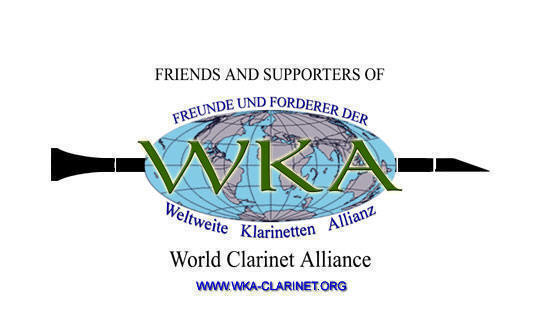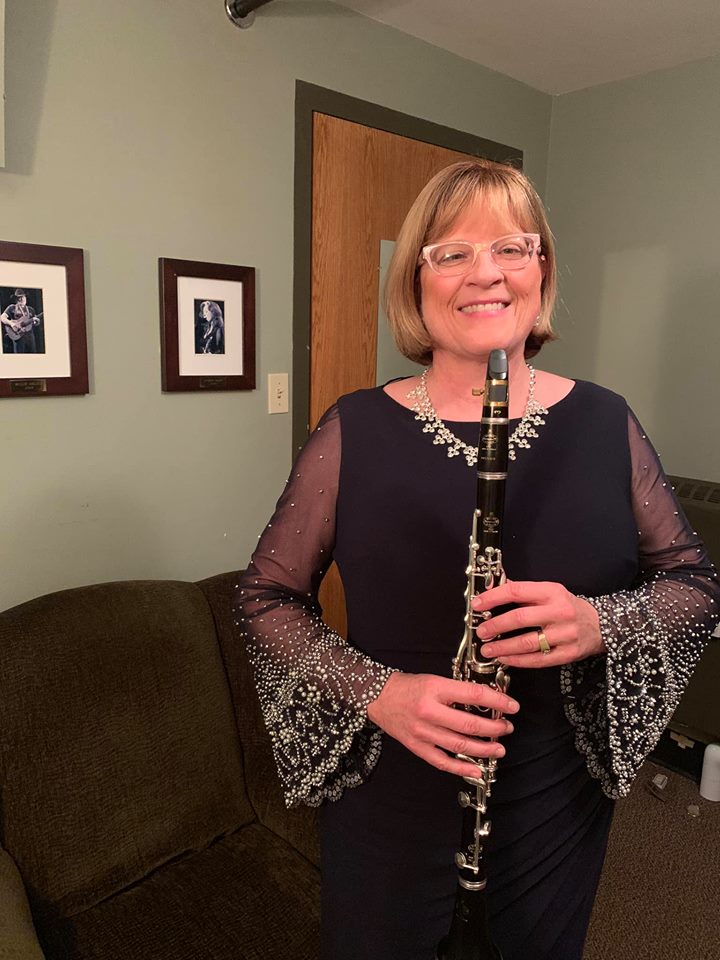
Click over Logo to Home Page
Introducing Artist VIP

Diana Haskell - Associate Principal Clarinetist in the St Louis Symphony and Acclaimed Chamber artist and Pedagogue
email: singlewinder@yahoo.com
Biography
“...Among the highlights was Rossini….this was a part that would challenge even a Marilyn Horne or Cecilia Bartoli. Haskell nailed it with terrific facility, lots of lyricism, and rich tone...” (Sarah Bryan Miller - St. Louis Post-Dispatch)
Diana Haskell is a multi-faceted clarinetist who enjoys a rewarding career as an orchestral clarinetist, educator, clinician and chamber musician. Ms. Haskell is currently Associate Principal Clarinet with the St. Louis Symphony Orchestra. In her role as Associate Principal Clarinet, the St. Louis Post-Dispatch has described her artistry as “hymn-like beauty”. Since 2003 Ms. Haskell has also performed numerous times with the St. Louis Symphony Orchestra as soloist, including with Maestro David Robertson and Maestro Jahja Ling.
Ms. Haskell is a respected teacher in the tradition of the Daniel Bonade School, through her training at Eastman School of Music with D. Stanley Hasty, as well as with Mitchell Lurie, with whom she studied at Music Academy of the West. In addition, her studies with the great diagnostician Joseph Allard at Juilliard and piano training with Maria Louis-Faini have given her a well-rounded foundation for building her own teaching and coaching expertise.
Ms. Haskell is currently Woodwind Coordinator at Chautauqua Institution School of Music, where she gives individual instruction to conservatory clarinetists and coaches mixed chamber groups. For five years Ms. Haskell recruited, organized and led her own Clarinet Intensive, a rigorous two-week immersion program for 5-7 advanced conservatory and high school students as part of the MasterWorks Festival. A supporter of minority arts initiatives, Ms. Haskell participates in the In Unison program with the St. Louis Symphony Orchestra as a performer, instructor and mentor at various locations in St. Louis. Ms. Haskell also teaches clarinet and is on the board for HEAL Center For the Arts, a vigorous after-school arts program in St. Louis for students in urban centers.
Ms. Haskell has taught at SUNY Buffalo, Houghton College, UW Whitewater, Savannah College of Art and Design, Armstrong State College, and Wisconsin Lutheran College. She has given master classes and clinics at universities in Japan, Europe and the United States.
Ms. Haskell's students have been accepted at Eastman School of Music, Indiana University, Roosevelt University, DePaul University, University of Missouri-Kansas City, Northwestern University, University of Minnesota, and Bowling Green State among others. Her students occupy positions with regional orchestras, in bands of the Armed Forces, as clarinet professors, and as orchestra and band directors.
After completing her Master of Music Degree at The Juilliard School and Bachelor of Music Degree at Eastman School of Music with Performer’s Certificate, she joined the Savannah Symphony Orchestra as Principal Clarinet. She also was Acting Principal Clarinet with the Charleston Symphony Orchestra for one season. Ms. Haskell then became Principal Clarinet with the Buffalo Philharmonic Orchestra with Maestro Semyon Bychkov, followed by Assistant Principal and E-Flat Clarinet in the Milwaukee Symphony Orchestra in 1991. Maestro Itzhak Perlman invited Ms. Haskell to join the St. Louis Symphony Orchestra as Assistant Principal Clarinet in 2003, and a year later Music Director David Robertson appointed her as Associate Principal and Eb Clarinet. Ms. Haskell was also Principal Clarinet with Santa Fe Opera.
As a result of being a finalist in the Naumberg International Competition, Ms. Haskell performed a solo recital in the Isaac Stern Auditorium at Carnegie Hall. Ms. Haskell was Principal Clarinet for the Grammy award-winning recording of Samuel Barber's Antony and Cleopatra, an opera directed by Gian Carlo Menotti and produced by New World Records.
Ms. Haskell’s high school studies were with James Barkow at Vandercook College. She was encouraged by her beloved grade school band director, Cloyd Myers, to begin clarinet at age 9. Ms. Haskell was a high school camper at Interlochen Summer Arts Camp, where she studied piano with Fernando Laires, and clarinet with George Townsend and Sidney Forrest. She has been Principal Clarinet in many summer music festivals, such as Santa Fe Opera, Spoleto Festival of Two Worlds, Colorado Music Festival, Sarasota Music Festival, National Repertory Orchestra, Washington Island Chamber Music Festival, and Lake Placid Sinfonietta.
Haskell’s CD, Clarinet Enchantments (AAM Recordings) has received critical acclaim. It may be purchased at iTunes.com or at Amazon.com. There is a complete list of recordings on the Media tab at her website, DianaHaskellClarinet.
Ms. Haskell is a proud Buffet-Crampon Artist for her clarinet maker, Buffet-Crampon. Buffet R-13s are her choice on all instruments. She is honored to be a Vandoren Artist as well. Ms. Haskell performs on a Vandoren BD-5 mouthpiece with Vandoren's Optimum Ligature or leather ligature, and Vandoren V-12 reeds.
Ms. Haskell’s blog, Clarinet Divas, is a teaching journal, with an emphasis on women who play the clarinet. She may be also be found on Facebook at Diana Haskell, Clarinet.
Teaching Philosophy
My goal is to discover, nurture, strengthen and encourage the creative talent within each clarinetist while always making artistry the highest objective. My teaching endeavors to guide students towards becoming the best musical version of themselves by developing all aspects of playing — musicianship, tone, technique and performance skills — in order to reach their highest potential, whatever their goals.
My experience as a professional performer, educator, soloist, and chamber musician informs my teaching practice and philosophy.
I employ a pedagogical approach that is rooted in a deep understanding of clarinet fundamentals and musicianship helping students to gain the skills necessary to succeed. Students study standard and contemporary works at their level. Discussion of phrasing and style in the manner of D. Stanley Hasty and Mitchell Lurie is ongoing. Joe Allard’s attention to releasing excess tension was the foundation for my study of the body. Because tightness can affect the ease of performance, I address tension issues and quickly find solutions. Students receive a thorough foundation for becoming outstanding clarinetists and exceptional musicians. This includes learning how to read pop and jazz charts, working on opera music, preparing for any type of audition, and reviewing strategies for starting teaching studios in urban centers.
When recruiting, I look for students who not only are superb musicians with keen rhythm, excellent tonguing and facile technique, but those who are patient with themselves, creative, kind, eager and engaged in the process of learning.
In addition, my studio is:
Results-oriented
The ultimate objective is to prepare students musically and technically for future aspirations, whatever they may be. Mastery of the clarinet will be accomplished by the study of etudes, methods, excerpts and repertoire, appropriate for each level.
Customized
Lessons are adapted to the individual’s needs and abilities. I am not interested in clarinet clones, but rather am passionate about guiding students to be the best versions of themselves as musicians. In short, I will strive to help students find their own unique ‘clarinet voice’.
Supportive in problem-solving
Issues and challenges of playing will be identified and solutions introduced in music being studied. If necessary, exercises specific to the problem will be given.
Thorough in studying best practice techniques
Intelligent practice is an art that must be learned in order to excel. In high school and college I largely sight-read music because no one showed me how to practice. My effective practice strategies only came about by playing weekly orchestra concerts, where large amounts of music must be learned quickly and thoroughly. This was trial by fire and nerve-wracking. Therefore strategies I have learned for efficient, intelligent practice will be shared in lessons. Based on years of teaching and performing, these methods are effective.
In closing:
The real challenge of the clarinet is as much about creativity, good phrasing, color in the sound and style as it is about brilliant technique. I believe that performing is not about our egos or how many notes we can play; it is truly about singing through the clarinet, serving the composer, and connecting with our audience.
Copyright © 1999 WKA-Clarinet.org. All rights reserved.
Revised: February 18, 2020